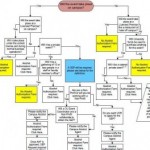
The Pianist and Unintentional Comedy
(A version of this post originally appeared on Pete’s blog.) A few months ago, Pete received an email from Nick Justicz (a comedy aficionado who has worked alongside comedians at The Comedy Store) commenting on my humor research. One part of his email stood out to me: I was watching the great film “The Pianist”… Keep Reading »

What makes things absurd?
(A version of this post was originally published on Pete’s blog). Why does absurdity lead to humor? Basically, somethings are so wrong that they spontaneously don’t seem real. BTW, here is the hilarious flowchart: …. Learn more about the benign violation theory. Check out Pete’s paper on psychological distance, which features work on hypotheticality: Humor… Keep Reading »

Things are not funny.
(This post was originally published on Huffington Post.) The studies run in the Humor Research Lab often require subjects to create something funny, like a write a joke or come up with an amusing caption. But when other folks are asked to rate what they’ve come up with, we run smack into an unfortunate truth:… Keep Reading »

Guest Post by Caleb Warren – Why is humor prevalent and pleasurable?
(A version of this post was originally published on Pete’s blog.) Apes, babies, and people everywhere (with the possible exception of Switzerland) enjoy humor. But why is humor so prevalent? And why is it so pleasurable? Why do we seek spouses, friends, books, movies, television programs, websites, and LOL cat photographs that make us laugh?… Keep Reading »

The Benign Violation Theory
(This blog was originally posted on Pete’s blog.) Below, Pete talks about the benign violation theory and discusses a paper, Benign violations: Making immoral behavior funny, that was published (with Caleb Warren) in the August 2010 volume of Psychological Science. The benign violation theory builds on work by Tom Veatch and integrates existing humor theories… Keep Reading »

